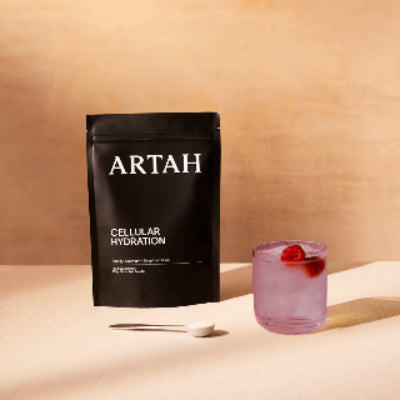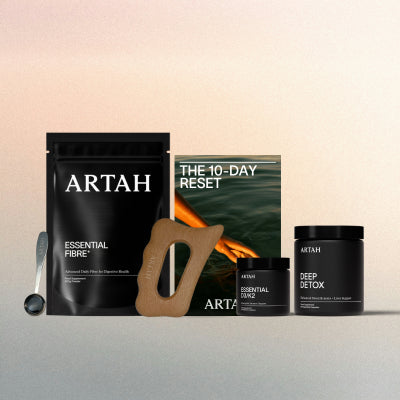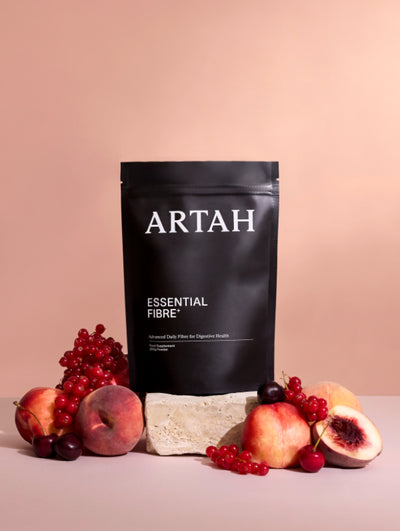What Is Cortisol Face?
Ever noticed how your face seems to give you away before you even admit you’re stressed? Perhaps it’s puffiness under the eyes, a breakout that appears out of nowhere, or skin that suddenly looks dull and tired. This phenomenon has been dubbed “Cortisol Face” - a reflection of the way our primary stress hormone, cortisol, shapes our skin and facial appearance.
While short bursts of stress are part of a healthy, adaptive system, chronic stress keeps the body locked in “fight or flight” mode, which has a myriad of downstream effects. This doesn’t just affect how you feel; chronic stress leaves visible traces on your skin, changes fluid retention, and increases inflammation.
Here’s the science behind the symptoms, and what to look out for.
What is Cortisol?
Cortisol is a stress hormone made by the adrenal glands, which are directed by a communication system in the brain called the HPA axis. In balanced amounts, it’s essential for health. Cortisol helps regulate metabolism, immune responses, inflammation, and even the daily rhythm that wakes us in the morning.
But when life’s stressors become relentless, cortisol levels can remain chronically elevated. Research shows this prolonged activation of the HPA axis disrupts immune balance, slows repair processes, and accelerates tissue ageing (1). The skin, our most visible organ, often bears the brunt.
What is “Cortisol Face”?
The term isn’t clinical, but it captures something many of us intuitively notice – that stress written on the skin. Elevated cortisol can drive a series of facial changes, including:
-
Puffiness and swelling
-
Acne or breakouts
-
Dull or dry skin
-
Fine lines and wrinkles
-
Redness or blotchiness
-
Dark circles under the eyes
Over time, these changes add up, giving the face a prematurely aged, fatigued, or inflamed appearance. In essence, “Cortisol Face” is the visible side of stress biology at work.
The Science Behind the Symptoms – What's Actually Happening
Collagen and Elastin Breakdown
Cortisol directly impacts dermal fibroblasts - skin cells that are responsible for producing collagen and elastin. Laboratory studies show that cortisol reduces collagen synthesis while increasing the enzymes that degrade it (2). The result? Weakened skin structure, fine lines, and sagging.
Oil Production and Blemishes
Stress hormones can increase activity in your sebaceous (oil) glands. This shift, combined with inflammatory mediators, predisposes the skin to clogged pores and breakouts. Human studies confirm that higher stress levels are associated with more severe skin flares. (3)
Inflammation and Slow Healing
In theory, cortisol is anti-inflammatory. In practice, chronic dysregulation does the opposite: it drives a low-grade, pro-inflammatory state. This suppresses immune balance, delays wound healing, and fuels skin redness and sensitivity. (4)
Poor Sleep and Circadian Rhythm Disruption
Cortisol follows a natural daily rhythm; surging to a peak in the morning to help wake us up and falling at night to encourage deep rest. Stress and poor sleep disrupt this cycle due to higher cortisol levels in the evening, which blunts our ability to release melatonin and fall into sleep. Disturbed cortisol rhythms are linked to impaired skin barrier repair, under-eye circles, and accelerated skin ageing (5).
6 Tools to Reduce Cortisol
1. Prioritise Quality Sleep.
We know from above that stress impacts sleep, but it’s also important to know that sleep impacts stress; studies have shown that sleep deprivation significantly increases evening cortisol levels, disrupting the HPA axis. (6) This is why a solid sleep routine is essential to avoid the vicious stress-sleep cycle. If you need help winding down, breathwork, yoga nidra, and legs up the wall pose are all surefire ways to start to calm the nervous system. Avoid screens, bright light and be mindful of eating too late (which can stimulate wakefullness).
2. Exercise – but with cortisol in mind.
Whilst exercise lowers baseline cortisol over time, very intense exercise will temporarily raise it. If you’re having difficulties with stress and sleep, ditch the intense cardio in the evening. With that being said, don’t ditch cardio all together; studies show that that regular aerobic exercise reduces cortisol reactivity to stress over time, making it an important stress reduction tool in the long run. (7) Focus on moderate movement like brisk walking, cycling, yoga, or strength training, and if you’re doing intense cardio or HIIT, get this in earlier in the day or even better – take a break until you can get your sleep under control.
3. Supplemental Support
Ashwagandha is one of the most studied adaptogenic herbs with a particularly rich base of data that supports its use in stress resilience. Studies have shown that Ashwagandha may modulate the HPA axis and reduce excessive adrenal activation. (10)
Magnesium is a high impact, inexpensive tool to add into busy routines to support stress resilience. It has a calming effect on the nervous system by balancing brain chemical, which can indirectly reduce the release of stress hormones like ACTH, which in turn lowers cortisol levels. (12) An 8-week randomized controlled trial showed that magnesium supplementation, alone or combined with vitamin B6, significantly decreased stress and improved quality of life. (13)
4. Practise Mindfulness or Meditation
Mind-body practices reduce perceived stress and directly lower cortisol levels. A review found mindfulness-based stress reduction (MBSR) programs led to significant reductions in cortisol in stressed populations. (8) Try 10–20 minutes daily of meditation, breathwork, or guided relaxation. The key is consistency and finding something that you will stick to. The more you practise, the more power it has.
5. Eat a Whole-Food, Anti-Inflammatory Diet
Highly processed food and excess sugar can worsen cortisol dysregulation, while whole foods stabilise blood sugar and reduce inflammation. Build meals around colourful plants, quality protein, and healthy fats (like olive oil, nuts, fatty fish).
6. Strengthen Social Connections
Supportive relationships buffer stress responses and lower cortisol levels. Studies have shown that people with higher social support had lower cortisol responses to acute stressors. Who we surround ourselves with can really make or break our health. Make time for meaningful connection, whether with friends, family, or community groups as part of your stress-management toolkit.
Cortisol has a dual nature. In short bursts, it’s adaptive and protective. But when prolonged, it erodes the body’s ability to repair, and our skin reflects that reality. The good news? Many of the same lifestyle choices that fuel stress and cortisol imbalance – like poor sleep, lack of exercise, and ultra-processed diets - can be consciously managed. By addressing the root causes of stress, we not only restore balance internally, but also reclaim a healthier, calmer appearance externally.
References:
-
Chen Y, Lyga J. Brain-skin connection: stress, inflammation and skin aging. Inflamm Allergy Drug Targets. 2014;13(3):177-90. doi: 10.2174/1871528113666140522104422. PMID: 24853682; PMCID: PMC4082169.
-
Chae M, Bae IH, Lim SH, Jung K, Roh J, Kim W. AP Collagen Peptides Prevent Cortisol-Induced Decrease of Collagen Type I in Human Dermal Fibroblasts. Int J Mol Sci. 2021 Apr 30;22(9):4788. doi: 10.3390/ijms22094788. PMID: 33946465; PMCID: PMC8125628.
-
Zari S, Alrahmani D. The association between stress and acne among female medical students in Jeddah, Saudi Arabia. Clin Cosmet Investig Dermatol. 2017 Dec 5;10:503-506. doi: 10.2147/CCID.S148499. PMID: 29255370; PMCID: PMC5722010.
-
V. Kahan, M.L. Andersen, J. Tomimori, S. Tufik, Stress, immunity and skin collagen integrity: Evidence from animal models and clinical conditions, Brain, Behavior, and Immunity, Volume 23, Issue 8, 2009, Pages 1089-1095, ISSN 0889-1591, https://doi.org/10.1016/j.bbi.2009.06.002.
-
Pujos M, Chamayou-Robert C, Parat M, Bonnet M, Couret S, Robiolo A, Doucet O. Impact of Chronic Moderate Psychological Stress on Skin Aging: Exploratory Clinical Study and Cellular Functioning. J Cosmet Dermatol. 2025 Jan;24(1):e16634. doi: 10.1111/jocd.16634. Epub 2024 Nov 6. PMID: 39506493; PMCID: PMC11743297.
-
Wright KP Jr, Drake AL, Frey DJ, Fleshner M, Desouza CA, Gronfier C, Czeisler CA. Influence of sleep deprivation and circadian misalignment on cortisol, inflammatory markers, and cytokine balance. Brain Behav Immun. 2015 Jul;47:24-34. doi: 10.1016/j.bbi.2015.01.004. Epub 2015 Jan 29. PMID: 25640603; PMCID: PMC5401766.
-
Gerber M, Imboden C, Beck J, Brand S, Colledge F, Eckert A, Holsboer-Trachsler E, Pühse U, Hatzinger M. Effects of Aerobic Exercise on Cortisol Stress Reactivity in Response to the Trier Social Stress Test in Inpatients with Major Depressive Disorders: A Randomized Controlled Trial. J Clin Med. 2020 May 11;9(5):1419. doi: 10.3390/jcm9051419. PMID: 32403243; PMCID: PMC7291068.
-
Khoury B, Sharma M, Rush SE, Fournier C. Mindfulness-based stress reduction for healthy individuals: A meta-analysis. J Psychosom Res. 2015 Jun;78(6):519-28. doi: 10.1016/j.jpsychores.2015.03.009. Epub 2015 Mar 20. PMID: 25818837.
-
Uchino BN, Cacioppo JT, Kiecolt-Glaser JK. The relationship between social support and physiological processes: a review with emphasis on underlying mechanisms and implications for health. Psychol Bull. 1996 May;119(3):488-531. doi: 10.1037/0033-2909.119.3.488. PMID: 8668748.
-
Velan Arumugam, Venugopal Vijayakumar, Arthi Balakrishnan, Rudra B Bhandari, Deenadayalan Boopalan, Ramesh Ponnurangam, Venkateswaran Sankaralingam Thirupathy, Maheshkumar Kuppusamy, Effects of Ashwagandha (Withania Somnifera) on stress and anxiety: A systematic review and meta-analysis,EXPLORE, Volume 20, Issue 6, 2024, 103062, ISSN 1550-8307, https://doi.org/10.1016/j.explore.2024.103062.
-
Sprengel, M., Laskowski, R. & Jost, Z. Withania somnifera (Ashwagandha) supplementation: a review of its mechanisms, health benefits, and role in sports performance. Nutr Metab (Lond) 22, 9 (2025). https://doi.org/10.1186/s12986-025-00902-7
-
Pickering, G.; Mazur, A.; Trousselard, M.; Bienkowski, P.; Yaltsewa, N.; Amessou, M.; Noah, L.; Pouteau, E. Magnesium Status and Stress: The Vicious Circle Concept Revisited. Nutrients 2020, 12, 3672. https://doi.org/10.3390/nu12123672
-
Noah, L., Dye, L., Bois De Fer, B., Mazur, A., Pickering, G., & Pouteau, E. (2021). Effect of magnesium and vitamin B6 supplementation on mental health and quality of life in stressed healthy adults: Post-hoc analysis of a randomised controlled trial. Stress and Health, 37(5), 1000–1009. https://doi.org/10.1002/smi.3051
Disclaimer: The information presented in this article is for educational purposes only and is not intended to diagnose, prevent, or treat any medical or psychological conditions. The information is not intended as medical advice, nor should it replace the advice from a doctor or qualified healthcare professional. Please do not stop, adjust, or modify your dose of any prescribed medications without the direct supervision of your healthcare practitioner.



















































